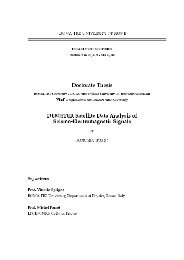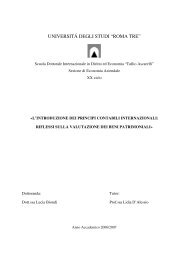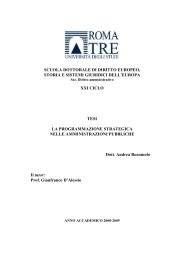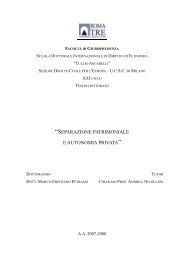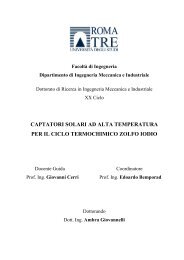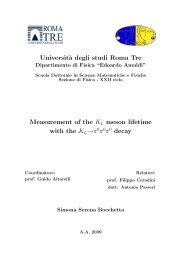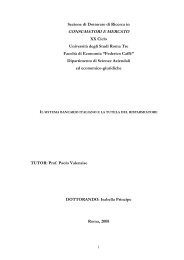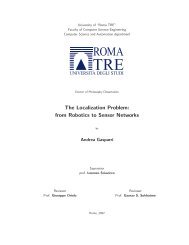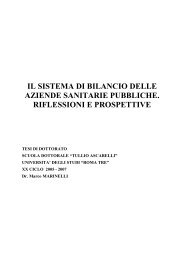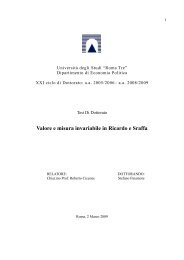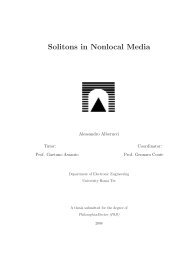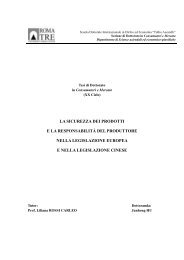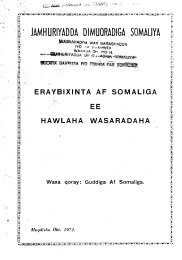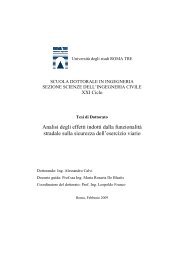DEMOCRAZIA SOSTANZIALE E ANALISI ECONOMICA DEL DIRITTO
DEMOCRAZIA SOSTANZIALE E ANALISI ECONOMICA DEL DIRITTO
DEMOCRAZIA SOSTANZIALE E ANALISI ECONOMICA DEL DIRITTO
Create successful ePaper yourself
Turn your PDF publications into a flip-book with our unique Google optimized e-Paper software.
conferiva la possibilità di controllare e regolamentare tutti gli aspetti della vita<br />
economica del paese 560.<br />
La democrazia sociale di Weimar ammetteva – o prevedeva – il proprio<br />
smantellamento senza nessuna violazione alle regole di decisione legislativa<br />
parlamentare, nella misura in cui – nonostante esistesse una procedura aggravata<br />
alla sua revisione 561 – gli articoli 25 e 48 della costituzione permettevano al<br />
Presidente del Reich di agire in regime di eccezione, ossia, agire in regime<br />
dittatoriale risalendo al marchio secondo cui l’autorità non era sottoposta alla<br />
legge, nel caso la legge costituzionale, ma si riconosceva, questo sì, come la forza<br />
legittima per la protezione della costituzione 562<br />
Si tratta specificamente dell’situazione che ha portato alla celebre<br />
discussione tra Carl Schmitt e Hans Kelsen, rispetto a chi spetterebbe la guardia<br />
della Costituzione 563. Il secondo, preoccupato con gli eccessi del potere, difendeva<br />
560 Nel 1935 il National Recovery Act fu dichiarato incostituzionale dalla Corte Suprema Americana,<br />
tuttavia, alcuni dei suoi corollari furono rinvigoriti più tardi dal National Labor Relations Act.<br />
561 Art. 76. The constitution can be amended by legislation. However, resolutions of the Reichstag in<br />
favor of an amendment of the constitution are effective only if two-thirds of those present consent<br />
thereto (…) Disponibile su: http://web.jjay.cuny.edu/~jobrien/reference/ob13.html.<br />
562 BERCOVICI, Gilberto. Constituição e estado de exceção permanente., op. cit., p. 76, risalta la differenza<br />
esistente tra costituzione e legge costituzionale secondo Schmitt. Art. 25. The President of the<br />
Federation may dissolve the Reichstag, but only once for any one cause. Art. 48. If a state fails to<br />
perform the duties imposed upon it by the federal constitution or by federal law, the President<br />
(...)may enforce performance with the aid of the armed forces.<br />
If public order and security are seriously disturbed or endangered within the Federation, the<br />
President (...) may take all necessary steps for their restoration, intervening, if need be, with the aid of<br />
the armed forces. For the said purpose he may suspend for the time being, either wholly or in part, the<br />
fundamental rights described in Articles 114, 115, 117, 118, 123, 124, and 153.<br />
The President (...) has to inform the Reichstag without delay of any steps taken in virtue of the first<br />
and second paragraphs of this article. The measures to be taken are to be withdrawn upon the<br />
demand of theReichstag.Where delay is dangerous a state government may take provisional measures<br />
of the kind described in paragraph 2 for its own territory. Such measures are to be withdrawn upon<br />
the demand of the President or of the Reichstag (...)The general election is held not later than on the<br />
sixtieth day after dissolution. Disponibile su:<br />
http://web.jjay.cuny.edu/~jobrien/reference/ob13.html.<br />
563 SCHMITT, Carl. Teoría de la Constitución. Madrid: Alianza Editorial, 1992, p. 333 e seg. KELSEN,<br />
Hans. La giustizia costituzionale. Giuffrè: Milano, 1981 p. 231-91. LIMA, Martônio Mont’Alverne<br />
Barreto. A Guarda da Constituição em Hans Kelsen. In: Revista Brasileira de Direito Constitucional. São<br />
Paulo. n.1, p. 203-9., Jan/Jun., 2003. BERCOVICI, Gilberto. Carl Schmitt, O Estado Total e o Guardião<br />
da Constituição. In: Revista Brasileira de Direito Constitucional. São Paulo. n.1, p. 195-201., Jan/Jun.,<br />
2003.<br />
165



